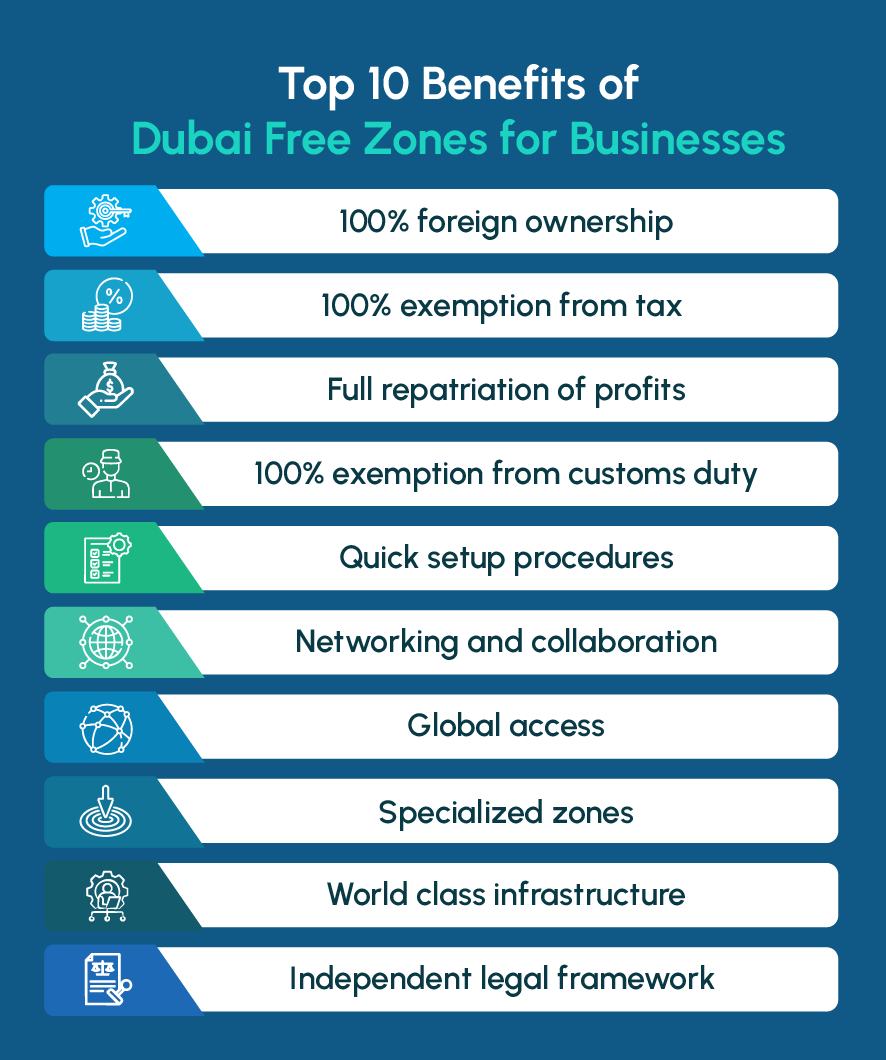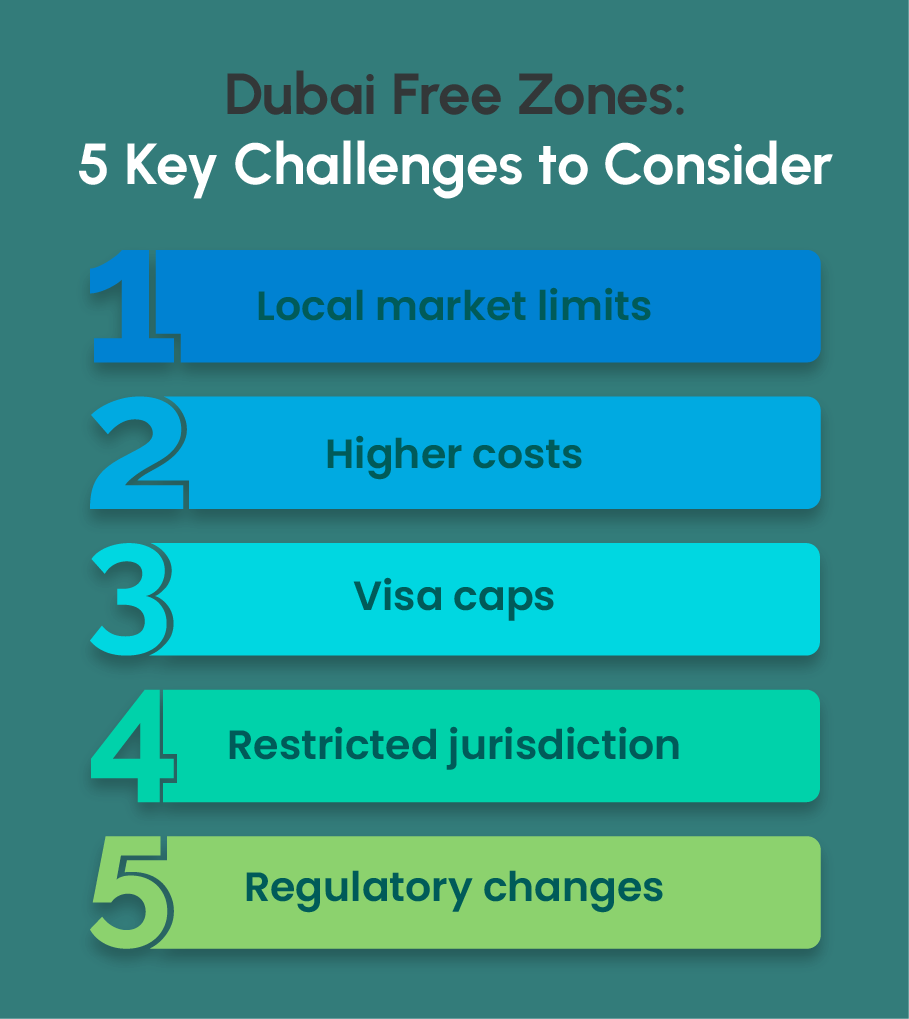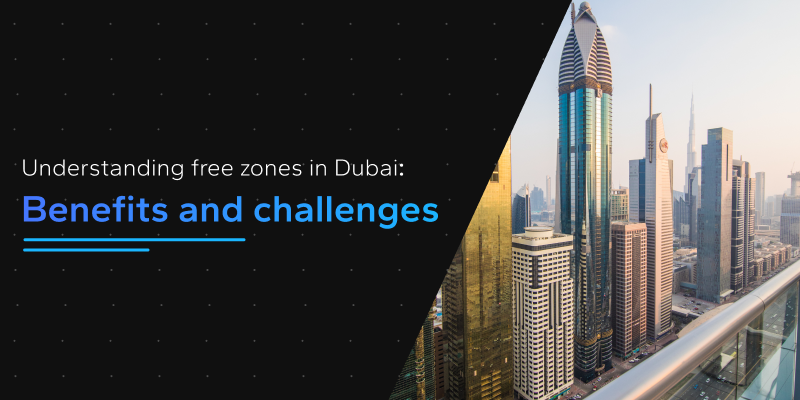When you are in Dubai, free zones feel like a world of possibilities. These vibrant business hubs invite you to dream big and global. Imagine setting up your company in Dubai with zero tax worries, full ownership and top-tier facilities. Each free zone buzzes with innovation, tailored to industries like tech, logistics, media, healthcare and finance. Entrepreneurs find it simple to start and grow their companies here. These zones combine financial perks and flexible regulations. Not sure what they are? Let’s explore why free zones are the heart of Dubai’s business ecosystem.
What are Dubai free zones?
Free zones are special business areas. They offer tax savings, quick setups and high end offices. Each free zone has its own rules. Think of them as VIP areas for businesses, offering perks and privileges that set you apart.
Benefits of free zones in Dubai

1. 100% Foreign Ownership
You own your business completely. An advantage is the ability to fully own your business without a local partner. This gives you complete authority over your operations and decisions, a rare privilege in many parts of the world.
2. 100% Exemption from Tax
Imagine running your business without the burden of corporate or income taxes. By setting up business in Dubai's free zones, this becomes a reality. Some zones even guarantee tax exemptions for up to 50 years, letting you reinvest savings back into growth.
3. Full Repatriation of Profits
You can transfer all your profits and capital freely, whether back home or elsewhere. This flexibility ensures your revenues are always within reach, benefiting global investors.
4. 100% Exemption from Customs Duty
The benefits of operating in a Dubai Free Zone include no customs duties on imports and exports, reducing overall operational costs.
5. Quick Setup Procedures
Getting started in Dubai’s free zones is really fast. Licenses can often be issued within days, thus freeing you to focus on your business.
6. Networking and Collaboration
Being part of a free zone means you’re surrounded by like-minded businesses. These hubs encourage partnerships, collaborations, and opportunities to connect with people.
7. Global Access
Free zones are strategically placed near major airports and ports that facilitate seamless international trade. This makes exporting and importing of products smooth and easy.
8. Specialized Zones
Every free zone has a unique focus, which creates industry-specific ecosystems. Dubai Internet City is a haven for tech entrepreneurs, Dubai Healthcare City offers a nurturing space for medical enterprises, and setting up a business in Dubai Silicon Oasis (DSO) is perfect for tech-driven startups.
9. World Class Infrastructure
Free zones provide top-tier infrastructure. This includes modern office spaces, state-of-the-art warehouses, logistics facilities, etc., to support seamless business operations.
10. Independent Legal Framework
Each free zone operates under its own legal system. These legal systems are specifically designed for businesses in that zone, which provides transparency, predictability, and a business-friendly environment.
Challenges of Dubai free zones

1. Local Market Limits
Companies in free zones cannot sell directly within the UAE mainland. For this, you’ll need a local distributor or agent to access the local market.
2. Higher Costs
Leasing office spaces or warehouses in free zones often comes at a premium rate. Renewal fees and other costs can add up, making it essential to plan your budget carefully.
3. Visa Caps
The number of visas your company can apply for is capped. It is typically tied to the size of your leased office space. So, expanding your team may require additional investments.
4. Restricted Jurisdiction
Free zone businesses operate under the jurisdiction of their specific zone authority. Though this provides focused governance, it can limit some business operations.
5. Regulatory Changes
Dubai’s business environment is dynamic and progressive. However, sudden regulatory changes can occasionally impact free zone businesses.
Choosing the right free zone
1. Know Your Industry
Select a free zone that aligns with your sector. For example, starting a business in Dubai Multi Commodities Centre (DMCC) is ideal for trading, while Dubai Healthcare City (DHCC) is perfect for healthcare enterprises.
2. Check Costs
Compare the costs for office spaces, licenses, and renewal fees across various zones to identify the most cost-effective option for your business.
3. Plan for Growth
Consider zones that offer flexibility with visa limits and infrastructure as your business expands.
4. Consider Market Access
If you need to sell locally, understand the distribution rules and ensure you have the necessary partnerships in place.
Top free-trade zones in Dubai
Ali Free Zone (JAFZA): Ideal for logistics and trade.
Dubai Multi Commodities Centre (DMCC): Ideal for commodities trading and a wide range of businesses.
Dubai Internet City (DIC): Suited for IT and tech companies.
Dubai Airport Free Zone (DAFZA): Tailored for aviation and logistics.
Final thoughts
Dubai’s free zones are an excellent choice for businesses looking to establish a presence in the Middle East with minimal regulatory and tax burdens. Thus, free zones make starting a business fast and simple. They’re perfect for global growth. Think of them as your shortcut to success. However, businesses must carefully evaluate their target markets, operational needs and long-term goals to determine if a free zone or mainland operation is more suitable.

